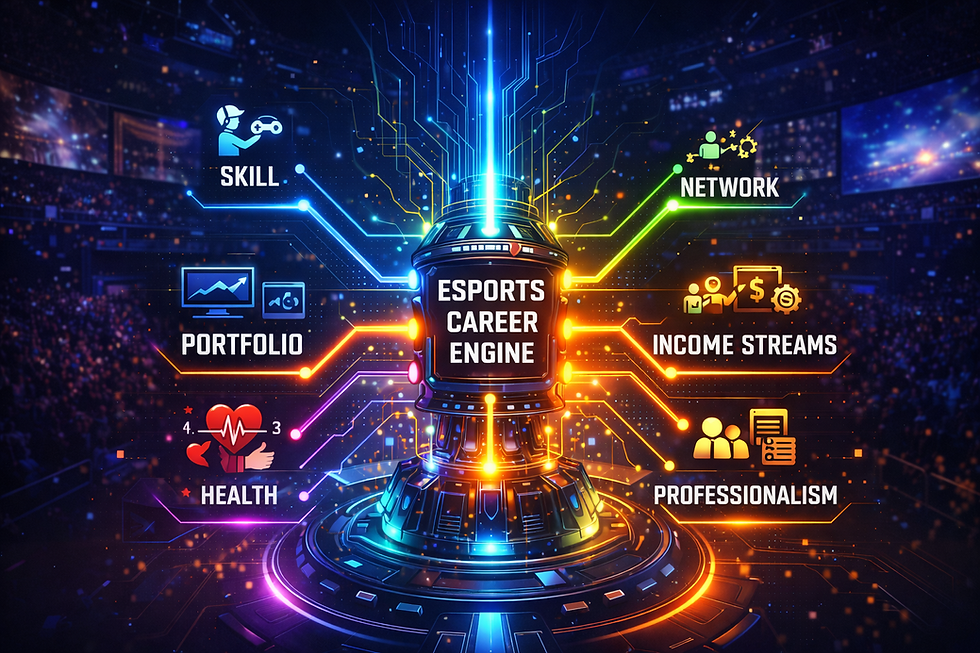🎮 The Educational Benefits of Esports in Schools
- Dr. Brian J

- Aug 16, 2025
- 3 min read
Updated: Sep 6, 2025
By Dr. Brian James ©2025
🔥 Why Esports in Education Matter
If you think esports are “just video games,” think again. Today, esports has grown into a $1.1 billion global industry with millions of players, fans, and even college scholarships. But beyond the professional stage, schools around the world are embracing esports as an educational tool.
As an Audiologist and advocate for innovative learning, I (Dr. Brian James) have seen firsthand how structured esports programs can transform classrooms—boosting student motivation, building teamwork, and preparing kids for the digital future.
🚀 Esports: More Than Just Play
When students participate in esports, they’re not just pressing buttons. They’re:
Collaborating in teams
Solving problems in real time
Communicating under pressure
Learning sportsmanshipand resilience
In fact, studies show that students in esports programs attend school more regularlyand feel more connected to their peers and teachers. For many, esports is the bridge that makes school meaningful.
📊 Table: The Positive Side of Esports in Schools
Area of Growth | Esports Example | Educational Value |
Teamwork & Leadership | A League of Legends team assigns roles (captain, support, strategist) | Builds collaboration and accountability |
Critical Thinking | Players analyze strategies in Rocket League | Enhances logic, adaptability, and focus |
STEM Readiness | Students learn streaming, coding, and broadcasting | Opens career pathways in tech & media |
Engagement & Motivation | After-school esports clubs | Improves attendance and participation |
Inclusion | Anyone can play regardless of athletic ability | Builds belonging and confidence |
Scholarships | 200+ U.S. colleges offering esports scholarships | Creates real opportunities for higher education |
🏫 Esports and Student Engagement
Think of esports as a 21st-century classroom engagement tool. When schools build teams or clubs around esports:
Attendance rises– students don’t want to miss practice or matches.
Discipline improves– just like with traditional sports, students must balance academics to remain eligible.
School spirit grows– esports tournaments bring excitement, cheering, and pride.
💡 In some schools, esports teams are drawing bigger crowds than basketball games!
🧠 Building Cognitive and Problem-Solving Skills
Esports aren’t mindless—they’re strategic and complex. Players must:
Plan multiple moves ahead (like chess, but faster).
React instantly to changing situations.
Collaborate on-the-fly with teammates.
Research shows that structured gaming can improve multitasking, attention span, and memory—skills critical in both education and careers.
👥 Inclusion, Confidence, and Social Belonging
One of the most powerful benefits of esportsis its inclusivity.
A student who doesn’t feel at home in football or cheerleading can still shine in esports.
Girls and boys compete side by side.
Students with physical limitations can thrive and lead teams.
For many, this is the first extracurricular activity where they feel fully accepted and celebrated.
🎓 College Scholarships and Career Readiness
Esports is now a legitimate pathway to higher education.
Over 200 colleges in the U.S.offer scholarships for esports athletes.
Programs go beyond gaming—covering analytics, broadcasting, coaching, and game design.
Students can earn degrees in Esports Management, Game Design, and Digital Media.
💡 Esports is not just a hobby—it’s a career pipeline into some of the fastest-growing industries.

✅ Final Takeaway
Esports isn’t just about gaming—it’s about unlocking student potential. With structured programs, esports can:
Boost engagement and academic motivation
Build teamwork and leadership skills
harpen critical thinking and problem-solving
Open STEM career pathways
Provide inclusivity and belonging
Lead to real scholarships and future opportunities
s Dr. Brian James, I believe the positive educational impact of esportsdeserves to be embraced by schools, parents, and communities everywhere.
🗣️ FAQ's
Q1. Why should schools consider esports programs?
Esports increase student engagement, build teamwork and leadership skills, and prepare students for STEM careers—all while providing scholarships and career pathways.
Q2. How do esports help students academically?
By improving attendance, focus, and motivation, esports programs support academic achievement. Many schools report higher GPA averages among team members.
Q3. Are esports inclusive?
Yes. Esports welcome students of all genders, backgrounds, and abilities, creating a sense of belonging for those who may not join traditional sports.
Q4. Can esports really lead to a career?
Absolutely. Beyond professional gaming, students explore careers in coding, game design, streaming, broadcasting, and analytics.
Q5. Do colleges give scholarships for esports?
Yes. Hundreds of U.S. colleges now provide esports scholarships, making gaming a real pathway to higher education.
📌 About the Author
Dr. Brian James, AuDis a board-certified clinical audiologist and co-founder of The Vault Gaming Center in Portsmouth, Ohio & ESPORTS Audiology. With a unique blend of expertise in hearing science and esports, Dr. James has become a leading voice on the intersection of gaming, education, and student development as well as the leading ESPORTS Audiologist. His work explores how esports in schoolscan build teamwork, critical thinking, STEM readiness, and inclusion. Passionate about empowering students, Dr. James continues to advocate for innovative approaches that connect digital learning with real-world skills and future career opportunities.



